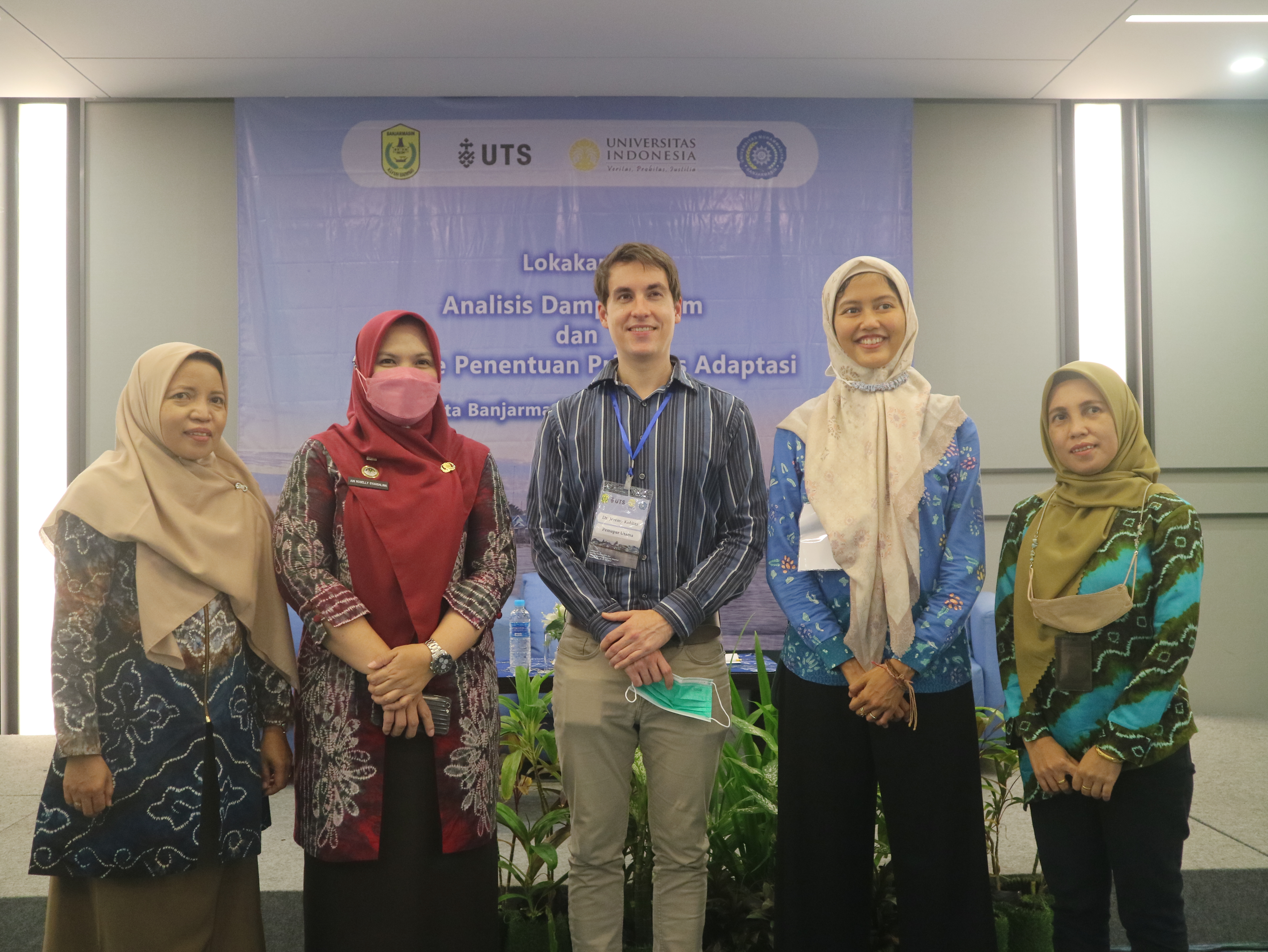Climate change that occurs evenly throughout the world, has a negative impact on various aspects of life, one of which is the impact on environmental sanitation. Departing from this condition, the community service team from the University of Indonesia (UI), Institute for Sustainable Futures, University of Technology Sydney (UTS-ISF), together with the University of Muhammadiyah Banjarmasin (UMB) held a Workshop on Climate Impact Analysis and Methods for Determining Adaptation Priorities on 26-28 July 2022 at the Rattan Inn Hotel, Banjarmasin.
Members of this community service team consist of researchers from the Faculty of Engineering, University of Indonesia (FTUI), UTS-ISF and the Faculty of Engineering UMB. The team is led by Dr. Cindy Rianti Priadi, S.T., M.Sc. (FTUI) and Dr. Jeremy Kohlitz (UTS-ISF). The three-day workshop invited a number of decision makers in the local government of Banjarmasin such as Regional Apparatus Organizations (OPD), such as the PUPR service, the Environmental Agency, the local Perumda PAL.
“This workshop raised the issue of climate change and its impact on sanitation. By 2050, it is estimated that more than 300 million people in the world will be exposed to repeated flooding as a result of sea level rise due to climate change. The flood will have an impact on access to sanitation services. This workshop aims to implement the framework that has been developed by the service team for risk identification due to sea level rise and an effective adaptation plan for the sanitation sector,” said Dr. Cindy who is also the Head of the Environmental Engineering Study Program, FTUI.
In his opening remarks, Assistant Mayor of Banjarmasin City, Ir. Doyo Pudjadi fully supports the efforts of academics and the Banjarmasin city government to be able to pursue activities that can increase climate resilience. “Hopefully with this activity, regional officials in Banjarmasin City can understand the dangers of climate to sanitation. Participants are also expected to be serious in implementing the action plans that have been made in this workshop so that our city’s sanitation will be better in the future.”
Dr. Jeremy Kohlitz from UTS-ISF delivered a presentation on “Climate change, sea level rise, and sanitation”. “Some examples of the impact of sea level rise on sanitation are the entry of sea water/flood water into the septic tank, toilets that cannot be flushed, and the entry of debris due to flooding into the septic tank. The community’s challenge is how to build resilience in the face of climate change and sanitation. Resilience is defined as the capacity of a system to continue functioning despite exposure to climate hazards.”
“Meanwhile, from the community side, adaptations that can be done in dealing with flooding are behavioral changes, physical/environmental changes and migration,” continued a member of the community service team from UMB, Fitri Wulandari, S.T., M.Sc.
The first day of the workshop closed with a Focus Group Discussion (FGD) session where the participants identified the sanitation service chain in Banjarmasin City using a shit flow diagram (SFD). Participants then discussed the flow of the sanitation service chain in Banjarmasin which was still not safe and also identified what components needed attention. Participants then mapped the hotspots of high risk zones for sanitation in Banjarmasin.
The second day of FGD opened with exposure to the impact of climate change on the sanitation system. Dr.Cindy led the participants to analyze the status of the flood-affected sanitation system, the impact of the flood-affected sanitation system on health, comfort, and financial loss, as well as the causes and root causes of the flood-affected sanitation system.
The team then delivered material related to several sanitation technology designs and how to manage them so that sanitation technology can withstand hazards, especially the danger of flooding. Participants were then asked to evaluate the level of resilience of the sanitation technology that has been implemented in Banjarmasin against climate change. Dr. Jeremy also explained 52 adaptation options to deal with climate change. Participants were then asked to choose several adaptation options that were effective and in accordance with the conditions of the City of Banjarmasin. From the results of narrowing the number of adaptation options, on the third day, Dr. Cindy led the participants to identify concrete action plans to achieve the adaptation options that had been determined.
Met on a separate occasion, the Dean of FTUI, Prof. Dr. Heri Hermansyah, ST., M.Eng., IPU said, “The FTUI Environmental Engineering Study Program has established partnerships with partner universities both from within and outside the country that support the Indonesian Government’s agenda to improve access to drinking water, sanitation and hygiene throughout the country. . The partnership includes research on climate change-resilient urban sanitation and drinking water quality. Both studies have produced clear evidence for actionable advocacy and recommendations, which the Government of Indonesia highly appreciates. Hopefully the adaptation options resulting from this workshop can be implemented immediately in the city of Banjarmasin and become a model for other cities in Indonesia.”
***
Public Communication Bureau
Faculty of Engineering, Universitas Indonesia

